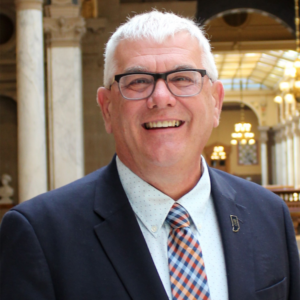300 attend meetings, 1,000 submit online surveys
Wayne County’s Hoosier Enduring Legacy Program team completed seven public meetings — attended by an estimated 300 people — and received about 1,000 online survey responses.
Now, it’s time to analyze the input and begin identifying and prioritizing projects.

As the HELP process proceeds, Denny Spinner, the executive director of the Indiana Office of Community and Rural Affairs, visited the March 15 meeting of Wayne County’s commissioners. Spinner talked about HELP as an extension of the Stellar Communities program, from which Richmond benefited, developed in 2010 following an economic downturn. Selected communities received funding help for transformational projects.
“This provided a boost for rural Indiana, and Stellar was the right program at the right time in 2010,” Spinner said. “Today, rural Indiana communities are facing another recovery effort: this one from a worldwide pandemic.”
Through HELP, OCRA assists communities with decisions about spending American Rescue Plan Act dollars they received to offset COVID-19’s effects.
“The Hoosier Enduring Legacy Program is an opportunity to promote stability in Hoosier communities while making them more resilient to future economic downturn should there be one,” said Spinner, who emphasized the legacy part of HELP.
Wayne County acted as the primary application agent for a collaborative effort that includes Cambridge City, Dublin, East Germantown, Economy, Milton, Richmond and Spring Grove. Each governmental unit will decide how to spend its ARPA allocation.
Commissioner Jeff Plasterer said the public input received so far, plus strategic plans recently formulated for county entities will be considered by four committees formed around the HELP pathways that match federal objectives for ARPA money. Those committees will identify projects and return them to a core team that will prioritize them and develop draft plans for each community.
Each committee will work with a state university. The committees are e-connectivity, chaired by Acacia St. John and working with the Purdue University Center for Regional Development; quality of life, chaired by Mary Walker and working with the Ball State University Indiana Communities Institute; community wellness, chaired by Sherrie Harlin-Davis and working with Indiana University Center for Rural Engagement; and economic vitality, chaired by Valerie Shaffer and working with Ivy Tech Community College.
“We’re looking forward to taking the next steps,” Plasterer said to Spinner. “Your team has been incredibly helpful. We’re going to do everything we can to help those small communities have significant impact even beyond what their ARPA dollars would allow.”
To help do that, Plasterer and Commissioner Brad Dwenger voted 2-0 to recommend the county pay for a certified grant administrator required by OCRA for the $1 million Community Development Block Grant it’s making available to Wayne County. Commissioner Mary Anne Butters missed the meeting while attending the annual transportation and roads conference at Purdue.
The block grant money will support a project or projects that impact low to moderate income areas. Cambridge City, Dublin, East Germantown and Milton qualify to apply for the funding.
The grant administrator would cost $80,000, which is the standard 8% of the grant, with the possibility for additional charges if a project requires environmental review or construction salary review. Plasterer projects a $100,000 final cost.
“My belief is that we’ve got seven communities that have agreed to work with us on HELP, and I really want to make this impactful for them. And this is one way to do that,” he said.
Dwenger agreed with the idea: “It makes perfectly good sense to me that we allow these communities to have access to the whole $1 million.”
The idea was formally presented to Wayne County Council during the March 15 evening workshop. No action was taken, but Council President Beth Leisure supported the idea.
“That’s huge to the small towns,” she said. “They just don’t have a lot to work with, and if you take that out of their project, they lose this from what they have to spend.”
During his address, Spinner said this HELP opportunity will result in immediate project benefits, and a prioritized project list will prove helpful in further state Regional Economic Acceleration and Development Initiative programs. Wayne County was part of an Eastern Indiana regional effort that received $15 million from the initial READI program.
“It gives you confidence to fully leverage those funds to meet your community needs, and it helps you empower your community by establishing systems for success and be a better partner in the region,” Spinner said.
A version of this article appeared in the March 29 2023 print edition of the Western Wayne News.
